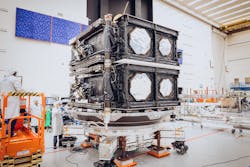EL SEGUNDO, Calif., - Boeing recently delivered the first two O3b mPOWER satellites to SES, a leader in global content connectivity solutions, based in Betzdorf, Luxembourg. The all-digital satellites are being prepared in Florida for launch to Medium Earth Orbit (MEO), 8,000 km from Earth, where they will provide low-latency, high-throughput connectivity to users around the world.
The satellites combine Boeing’s 702 platform, Boeing subsidiary Spectrolab’s custom-designed solar arrays built to withstand harsh MEO radiation, and the 702X software-defined payload providing more than 5,000 steerable beams per satellite.
“SES's O3b mPOWER system is a true gamechanger and will transform the way people think about connectivity,” said Ruy Pinto, Chief Technology Officer at SES. “Delivering performance above all, O3b mPOWER will offer connectivity services to government organizations and enterprises based in the most remote regions. In times of natural disasters, when networks are disrupted, O3b mPOWER’s low-latency services can quickly restore critical communications networks.”
Instead of relying on fewer, larger, fixed beams or a proliferated Low Earth Orbit (LEO) constellation covering vast regions – systems that struggle to fulfill high-density demand – the software-driven O3b mPOWER system is equipped with shapeable beams that can be repositioned based on real-time data from SES customers’ terminals, delivering a superior end-user experience.
With Boeing contracted to deliver 11 O3b mPOWER satellites to SES, Boeing continues production, integration and testing of the remaining nine spacecraft.
“SES approached us with a vision to create global equity, by providing people with high-speed connectivity where it wasn’t economically or physically feasible to build fiber infrastructure,” said Jim Chilton, senior vice president of Space and Launch at Boeing Defense, Space & Security. “We partnered to create a super computer constellation in space to meet that goal, and we can’t wait to see what SES does as the 702X platform’s first user.”

